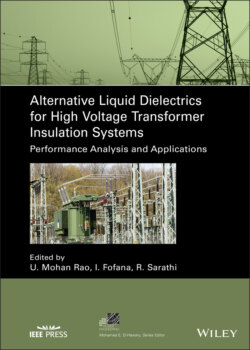Читать книгу Alternative Liquid Dielectrics for High Voltage Transformer Insulation Systems - Группа авторов - Страница 50
2.4.2.4 Oxidation Stability
ОглавлениеThe liquid insulation that is used in power transformer must have higher stability toward oxidation. In terms of oxidation stability, natural esters are not known to perform very well as they tend to oxidize very easily and thus they are not suitable for free‐breathing transformers. When these oils come in contact with oxygen, they produce sludge and also the viscosity changes. The addition of antioxidants, however, can slow down the oxidation process. The degradation reaction occurring in the MO leads to the breakage of bonds between two carbon atoms and the formation of alkenes. This happens mainly because of oxidation, dehydrogenation, and cracking. In natural esters, oxidation and hydrolysis occur forming CO, CO2, and other by‐products. The method of oxidation varies between natural esters and MO as the by‐products formed in NEOs do not solidify and settle down, but it increases the viscosity.
Though antioxidants can be added to NEOs, they still tend to show lower oxidation stability due to higher biodegradability than MO, and so it is essential to use natural esters in sealed transformers [63]. It is always essential to choose a NEO with the optimum combination of saturated and unsaturated triglycerides. It is to be noted that ester oils with higher content of saturated triglycerides exhibit higher pour points and viscosity, whereas the ones with higher unsaturated triglycerides are more prone to oxidation. Stability toward oxidation of natural esters depends on the distribution of fatty acids, refining process, and the presence of natural antioxidants. The refining process of natural esters also affects the oxidation stability as there are many intermediate processes that lead to decrease in amounts of natural antioxidants, if present.
